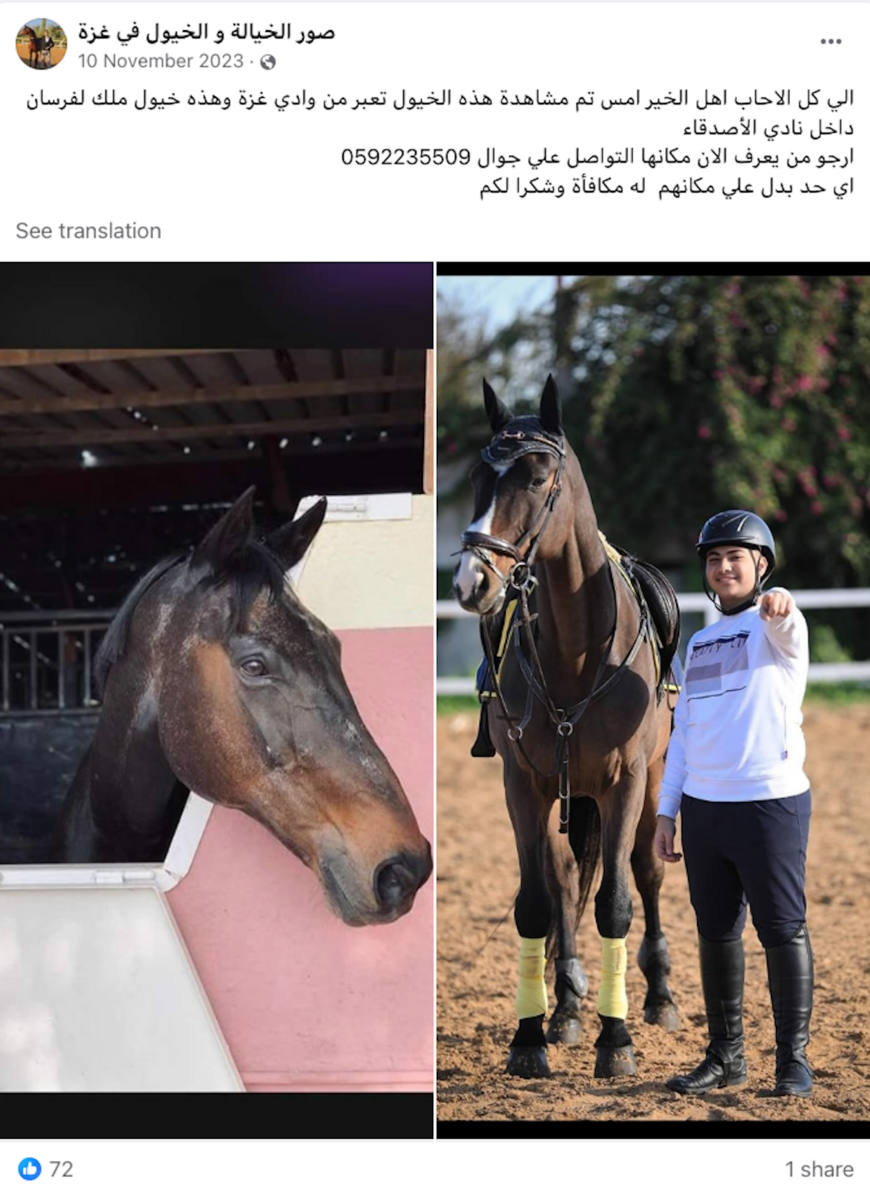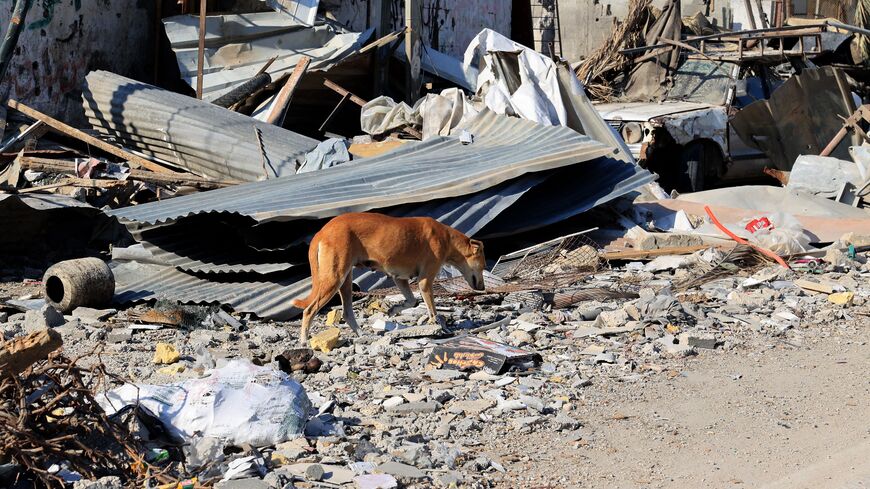RAFAH, Gaza Strip — The ongoing Hamas-Israel war in the Gaza Strip has wreaked havoc across the Palestinian enclave, killing more than 31,000 people, destroying much of the territory's infrastructure, and leaving a quarter of the 2 million residents on the brink of famine.
Gaza's animals have also not been spared. Animals in captivity, on farms, in shelters and in homes have been killed or wounded in the Israeli strikes or displaced, according to several local and international organizations. Others have gone missing. Like Gaza's population, the animals that survive are suffering from the lack of food and medicine due to the Israeli blockade of the enclave.
The risk of diseases is also rampant among animals in Gaza. The Israeli health ministry warned its citizens against bringing displaced and lost pets from Gaza into Israel.
It said last month that doing so without a permit “may spread diseases including rabies, echinococcus, leishmania, Leptospirosis, scabies and more."
For Gazans who raised and sheltered those animals, it's a far worse reality. Luna Ashour, a 16-year-old from Al-Nasr, a neighborhood west of Gaza City, continues to mourn the loss of Plutonium, her Belgian horse, who was killed in December by an Israeli strike on the Qarara area, northeast of Khan Younis.
“I have been horseback riding on a daily basis at the Friends Sports Club [in the Sheikh Ajlin neighborhood, in southern Gaza City] since 2018. But after the war broke out, I was forced to move to Deir al-Balah governorate, in the south, but I couldn’t take Plutonium with me,” Ashour recounted to Al-Monitor, speaking by phone from Deir al-Balah where she remains with her grandmother.
“I continued to routinely check on my horse through the club’s management, until I was told that everyone had been displaced, and the horses had been left behind, alone, due to the Israeli ground invasion [in Gaza City]."
Ashour even posted several appeals on social media to find Plutonium and offered to pay anyone who found him.

(A Facebook post advertising a missing horse in Gaza)
“I roamed the streets and alleyways daily, looking for him, but to no avail,” she said. “That was until the club’s management told me that Plutonium, along with five other horses, were transferred to the east of Khan Younis governorate and that he had been killed in the ground invasion.”
“I don’t know what my horse did wrong to deserve this death. My heart aches. I begged [the club] to let me say goodbye. But I couldn’t reach the area because it was unsafe," Ashour added.
Abdulaziz Abu Sharia, executive director of the Palestinian Equestrian Federation in Gaza, told Al-Monitor that the Israeli ground invasion has destroyed all the major equestrian clubs located on the northern and eastern borders with Israel and along Gaza’s coast. There are six clubs affiliated with the federation, according to Abu Sharia.
Abu Sharia, who moved to Egypt during the fighting, said that clubs' facilities and stables were completely wiped out, and the horses were killed. According to a report prepared by the federation and provided to Al-Monitor, seven workers in the clubs guarding horses were also killed. One additional worker was confirmed injured, but Abu Sharia added that the number of casualties may be higher as there are several workers still missing who he has been unable to reach.
The federation along with the International Olympic Committee called on global sports institutions, the Red Cross, and the International Equestrian Federation to save the more than 150 horses that were inside the federation’s clubs and remained alone without water, feed or veterinary care, Abu Sharia said, before admitting that all appeals "were futile."
"The military operation killed almost 90% of the horses, while the rest are still missing. We know nothing about them," Abu Sharia lamented.
Ahmed al-Hayek, 26, was forced to flee his house in the Tal al-Hawa neighborhood of Gaza City, but not without his two pet turtles.
“On the night of Oct. 20, clashes broke out between Hamas and Israeli forces near Tal al-Hawa, which forced us to leave as fast as possible,” Hayek told Al-Monitor. “We couldn’t even take basic supplies with us. But I came back halfway and took my turtles. How could I leave them? They would have starved to death alone or died of fear,” Hayek, who left to Rafah, said.
Saving Gaza’s animals
Photos and videos of dead animals, emaciated dogs, starving cats and flocks of birds in Gaza have been circulating on social media since the war began in early October. Many were killed, but others starved to death. The survivors are traumatized. Some also suffer physically in the absence of veterinary care.
I am deeply concerned ( not @UN style)about the stray dogs in Gaza. With the majority of people having no food and leftovers, these poor animals are at risk of death due to the lack of food or water, and that's if they aren't killed by bombs first. Looking into their faces, you… pic.twitter.com/ppkkXzFIQM
— Abdalhadi Alijla عبد الهادي العجلة (@alijla2021) November 4, 2023
Sulala Animal Rescue, the only such organization in Gaza, faces many challenges in its efforts to save animals from live military operations.
Sulala Animal Rescue, with headquarters in Al-Zahra City, in southern Gaza, was founded in 2006. Before the war, the organization managed several animal shelters, taking in stray or abandoned animals.
Al-Monitor attempted to contact Said al-Arr, Sulala's founder, but to no avail, due to the frequent internet and communication outages in Gaza. Al-Monitor did, however, reach Belgium-based Annelies Keuleers, a spokesperson for Sulala.
“One of our shelters in the north of the Gaza Strip housed 400 dogs, and Said used to check on them and feed them at the beginning of the war, but the ground operation in the north completely destroyed the area,” said Keullers, who spoke to Al-Monitor via WhatsApp. “We do not know what happened to the dogs there since the north has been cut off from the south.
“Said also rented an apartment in Gaza City that housed 120 cats, but after the Israeli army ordered the residents of northern Gaza to evacuate to the south, he had to leave for his own safety while taking all the cats with him.” Keuleers added, “He then settled in the Nuseirat governorate, in the south, took in some hungry stray dogs and purchased some horses and donkeys that were exhausted from pulling carts and moving people around.”
Keuleers remarked on how Arr continues to care for animals despite the war and destruction, refusing to abandon them.
She also described the lack of animal food in Gaza and that shops selling animal-related goods and supplies had closed on Oct. 9.
“As animals are facing a looming famine, we at Sulala launched a campaign through PayPal to collect donations and secure funds to buy animal feed and necessary medications,” Keuleers said. “In late November, we were able to buy food in coordination with [the Egyptian animal association] Safe Haven for Donkeys, and we sent a batch in an aid truck bound for Gaza’s citizens."
However, since last month, the truck has been stranded on the Egyptian side of the Rafah border crossing and hasn’t entered Gaza yet.
“We appealed to the United Nations, Red Cross and Israeli authorities to allow the entry of the truck. But given the security conditions and the [security] threats the aid teams are facing, they have been unable to ensure the truck’s entry," she added.
Death in captivity
Several farms housing cows, sheep, chickens and camels have largely been destroyed in the war. The head of the Poultry Breeders and Animal Production Syndicate in Gaza, Marwan al-Helou told local media, that 90% of Gaza's 6,500 poultry farms were destroyed in the war. According to a December report by the UN Food and Agricultural Organization (FAO) on the damage on agricultural infrastructure and land in Gaza caused by the war, 149 sheep farms have been destroyed, as well as five cattle farms, 20 dairy farms and 172 broiler farms (chicken raised for meat), and fish farms along the coast were wiped out when Israel bulldozed the entire coastline. According to a November report by the Palestinian Central Bureau of Statistics (PCBS), agricultural production in Gaza suffered nearly $1.6 million in direct daily losses due to the war. "The real cost is much higher when factoring in the destruction of agricultural property and assets and the bulldozing of land," the PCBS said. There are also, of course, the human and animal costs as a result of the food shortages.
Thank you so much to everybody who has been supporting us throughout this war. We are very grateful for your support. If it were possible – Saeed would send you all individual messages thanking you. We often tried to answer some of your frequently asked questions below: pic.twitter.com/NYkOD3b84g
— Sulala Animal Rescue (@SulalaSociety) December 20, 2023
Animals in captivity have also fallen victim to the war's devastation, with the zoo in Gaza City's Zeitoun neighborhood being reduced to rubble by Israeli bombardment.
Yahya al-Sarraj, mayor of Gaza City, told Al-Monitor in an interview by phone, “The strikes killed the majority of the animals there, which included 100 animal species like lions, foxes, monkeys, ostriches, and peacocks."
“When the war first erupted, two zoo workers headed to the zoo to try and rescue the animals, but the municipality car they were riding in was hit by an Israeli strike, leaving them with injuries,” Sarraj said. “Some workers of the municipality eventually reached the zoo when the [7-day] truce began [in late November], and we found that 90% of the animals had died. The rest were suffering from disastrous conditions due to hunger, shock, and trauma from the sound of shelling.”



